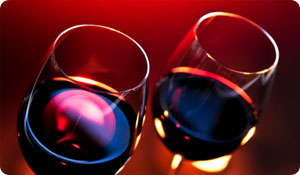
There are so many theories floating around about how to live a longer life. Exercise is a definite life extender, doctors confirm. Eating healthfully, with a focus on fresh produce and unprocessed foods, also buys you time. Avoiding the sun. learning how to deal with stress, and maintaining a healthy weight-all of these things can help you reach your eighties and beyond. But is the secret to a longer, healthier life as simple as uncorking a bottle of red wine? Quite possibly, experts say.
It's long been observed that people in wine-drinking countries, such as France and Italy, enjoy a higher quality of life than Americans do, as well as a longer life. This is despite their relatively high consumption of so-called unhealthy foods such as butter, cheese, oil and pasta. While there may be other factors involved in their longevity and vitality, such as smaller portions and a more relaxed pace of living, scientists have confirmed that red wine, which they tend to drink with meals, does indeed have measurable health benefits. The key? A compound found in red wine known as resveratrol. Resveratrol has been found to prevent certain cancers as well as boost cardiac health by protecting blood-vessel linings, preventing clots, and lowering "bad" cholesterol levels, all of which can certainly extend a person's lifespan.
The catch is that most of the research involving resveratrol and its life-extending benefits have been performed on mice. A recent Harvard Medical School study found definitive proof that resveratrol reversed nearly all of the physical damage wrought when mice were put on high-calorie diets and beefed up to obesity levels. Indeed, the hefty mice treated with resveratrol went on to live as long as their leaner counterparts. But another problem is that for humans to receive doses of resveratrol equivalent to the ones the mice received in this study, they would have to consume anywhere from 100 to 1,000 bottles of red wine per day, an amount that would be fatal.
While doctors don't want to encourage teetotalers to take up drinking, it stands to reason that red wine with a meal can't do any harm for most people, and may in fact do plenty of good. So if a trip to France or Italy isn't in the cards this summer, pretend you're in Europe anyway: Grill a fresh piece of fish with pasta or rice, sauté some local greens, and savor a glass of red with your favorite travel companion.
Sources:
Harvard Medical School
United States National Library of Medicine
Mayo Clinic





